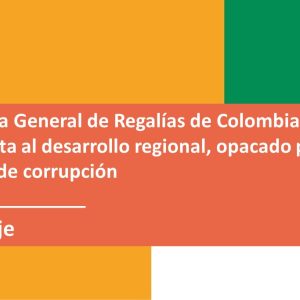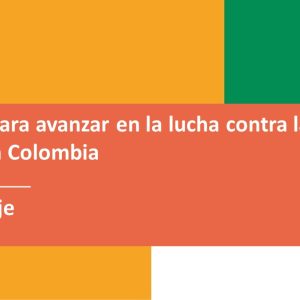97.92 percent of the population voted no to gold mining in their territory.
The election day passed calmly and was marked by rain and cold, which did not stop the citizens of the municipality of Tolima from attending the appointment.
After eight hours in which the polls remained open, the no vote obtained 6,165 votes in favor and overwhelmed the yes vote, which only reached 76 votes, while there were 41 unmarked ballots and 14 invalid ballots.
César Bocanegra, delegate of the National Registrar in Tolima, stated that, for the consultation to be valid, 5,438 votes were needed, and a total of 6,286 votes were obtained. That is to say that its validity, according to the law, is not in doubt.
“Citizens were able to participate in the democratic day without any inconveniences,” certified the registrar.
Yesterday’s result means that the municipality rejected the possibility that AngloGold, a multinational company that has been exploring for 10 years in the La Colosa project to extract 28 million ounces of gold, can exploit this mineral wealth.
During the last few weeks, arguments for and against moving forward with this project were heard, which gave rise to controversy among different sectors of the municipality.
While some said that gold mining would affect the municipality’s water sources, others focused on the damages that several miners and their families would suffer due to the lack of activity in the region, in case the “no” vote won.
Binding?
One of the first questions that many interested parties began to ask yesterday is to what extent the result of the popular consultation in Cajamarca is binding or mandatory for the corresponding authorities.
There is still no clarity on this issue: while some legal experts in popular consultations maintain that it is, the Government expresses its doubts.
The Dejusticia Corporation insists that the law regulating citizen participation mechanisms indicates that if the minimum threshold is exceeded -which happened yesterday in Cajamarca- the result of the vote must be respected. However, the Government, through the Vice Minister of Mines, Carlos Cante, has the thesis that “there is no clarity” on this matter.
Last night, AngloGold stated that it respects “the mechanisms of citizen participation” and their results. “In view of the result, we will analyze the consequences and the impact it has on the project and on mining in Colombia,” said the company.
While this is being clarified, the inhabitants of the municipality expressed their opinions on what they consider to be the benefits and detriments of the decision made at the polls.
A farmer from the region, Alberto Peña, said he voted “because water is the source of life, while gold is vanity” and will only bring them “problems”.
Evelio Campos, coordinator of the NGO Ecotierra, affirmed that the NO won because Cajamarca is a town with a purely agricultural vocation.
“It would have been sad and serious for mining to win in a land where water springs from the mountains and agriculture is the main economic activity,” Campos said, and recalled that in the upper part of the municipality, where the La Colosa gold mining project is planned, the Vermilion, Anaime and Toche rivers originate, which together form the Coello River.
Róbinson Mejía, coordinator of the No to Mining Committee, said that “the vote was the voice of the people”.
When the results of yesterday’s referendum were known, there were marches and demonstrations of celebration that went through the streets with flags.
“Yes we did it, we want water, we don’t want gold!” chanted several demonstrators as they expressed their happiness for the people’s rejection of mining exploitation in their territory.
“We celebrate the triumph of water over gold. Thank God we were able to show that we don’t want mining exploitation here because it destroys our rivers and streams,” said a young man waving a flag.
The Colombian Mining Association, for its part, presented a communiqué in which it stated: “It is important to recognize the results of the consultation carried out in Cajamarca. This obliges us to work harder to build relationships in our territories. However, we are concerned about the proliferation of this type of mechanism in several departments as a source of decisions on different types of projects and industries in the country. This increases legal uncertainty, slowing down mining investment and, in turn, social development projects in the regions“.
FABIO ARENAS JAIMES
Special Envoy of EL TIEMPO
Cajamarca


